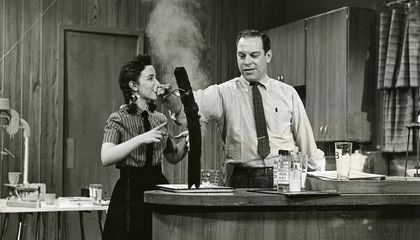 |
| Don Herbert with one of his books looking on at an experiment. |
Watch
Mr. Wizard debuted on March 3, 1951. Filmed live, the series starred
Herbert as Mr. Wizard, a science hobbyist, who would show either a little boy
or girl a science experiment. To hook the audience, Herbert would show the
results of the experiment, then proceed to explain how it was done and the
science behind it. The experiments seemed extremely complicated at first, but
ended up being simple and easily re-created by viewers at home. In fact, to
keep the show accessible, Herbert refused to don a lab coat and performed his
experiments in a garage or kitchen-like setting with everyday household items
(which also helped stretch the practically non-existent budget).
 |
| Mr. Wizard demonstrating an experiment to one of his young female assistants. |
The series proved a hit, drawing in
millions of viewers. It was broadcast
live by 14 stations by 1954, and an additional 77 stations aired the show via
kinescope recordings. It also netted a Peabody
Award and three Thomas Alva
Edison National Mass Media Awards. By 1956, over 5,000 Mr. Wizard science
clubs were created with an estimated membership of more than 100,000 people
(that number increased to 50,000 clubs within the next decade). Teachers had
also begun incorporating the experiments from the show into their lesson plans.
Initially, the show was sponsored by The Cereal Institute until 1955. NBC took
over financing by classifying it as a public affairs program from its news
division. The series also moved production from Chicago to New York.
 |
| Science! |
After 547 episodes, NBC cancelled
the series in 1965; feeling that it had run its course and audiences weren’t tuning
in to be educated. However, Herbert wasn’t done with edutainment yet. He
produced an 8-film series called Experiment: The
Story of a Scientific Search that aired on public television
through grants from the National Science
Foundation and the Arthur P. Sloan Foundation,
as well as Science
20, which were 20-minute films of experiments designed for use in
classrooms. In 1968, Herbert formed Mr. Wizard Enterprises, Inc. to raise money
for production and distribution of his classroom films. He also penned numerous
articles and opened a Mr. Wizard Science Center in Wellesley, Massachusetts.
After five years off the air, NBC
decided to produce a revival of the series. Production was done in Ottawa,
Canada and in color for the first time. Renamed simply Mr. Wizard, the
revival debuted on September 11, 1971 and ran for a single season of 26
episodes. Additionally, Herbert produced 50 Mr. Wizard Close-Ups which
were 30-second spots that would also air on NBC Saturday mornings, and later on
ABC-affiliated stations. The Close-Ups would
receive a nomination for “Outstanding Individual Achievement in Children’s
Programming” from the National Academy
of Television Arts and Sciences. Herbert continued producing educational
content, including one last revival of Mr. Wizard as Mr. Wizard’s
World on the then-fledgling Nickelodeon
network in 1983.
 |
| Behind the scenes photo during Mr. Wizard's NBC tenure. |
Herbert is often credited with
inspiring scientific interest and curiosity within generations of children,
with some of them going on to careers in science themselves. Further, Herbert’s
legacy continues to be recognized in pop culture: such as having the penguin
puppets named after him on similar science program Beakman’s
World, a mention of his program in the “Weird Al” Yankovic song “Cable TV”, and most
recently as the inspiration for the Professor Proton character played by Bob Newhart on The Big Bang Theory.
 |
| Later edition of one of Herbert's books. |
During his career, Herbert had
published several books expanding on the science he taught about, including Mr.
Wizard’s Science Secrets from Popular Mechanics (which also came
with a science
kit), Mr.
Wizard’s Experiments for Young Scientists from Doubleday, Mr.
Wizard’s 400 Experiments in Science from Book-Lab, Inc., and Mr.
Wizard’s Supermarket Science from Random House. In 1952, a Mr.
Wizard home science kit was released in stores and later reissued
in 1999. Before his death in 2007, Herbert personally curated a selection
of episodes from his various runs for release on DVD through his Mr. Wizard
Studios. 32 episodes from the original run were released across 8 volumes
either individually or as a set. Additionally, two coffee mugs
featuring the logos from his first and last series were offered.

No comments:
Post a Comment